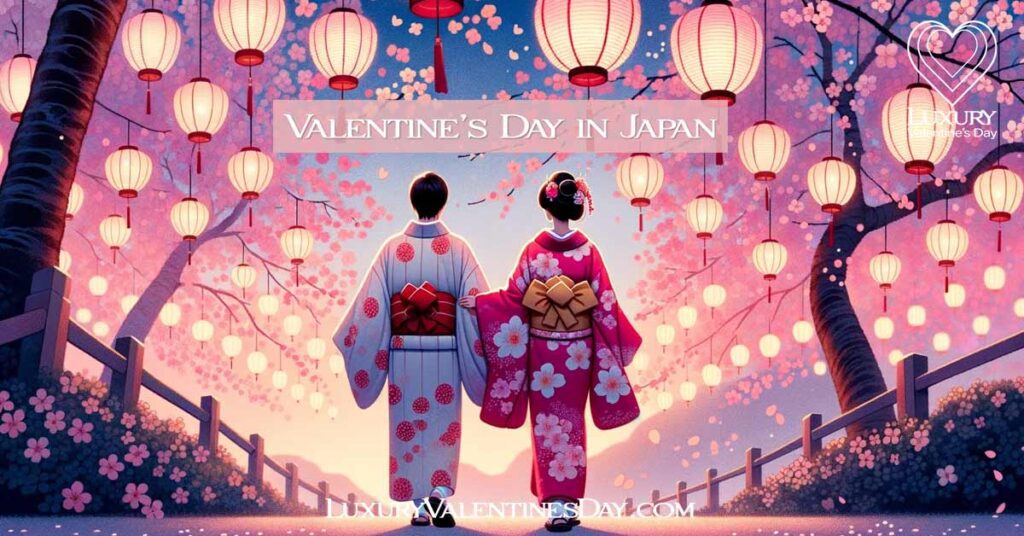
The Unveiled Mysteries of Valentine’s Day in Japan
Picture this: You’re strolling through Tokyo’s neon-lit streets, and suddenly you’re swept into a whirlwind of love—but not like anything you’ve seen before. This is Valentine’s Day, Japan-style, where tradition and modernity collide in the most romantic ways. Intrigued? Stick with me, and we’ll explore how Japan has redefined this universal celebration of love. You’re in for a treat that goes way beyond chocolates and roses.
This article is part of the series looking at how Valentine’s Day is celebrated around the world.
The Intricacies of Love in the Land of the Rising Sun
Japan, a country where ancient traditions and cutting-edge modernity coexist in a harmonious dance. But when it comes to love and affection, Japan adds its own unique flair that you won’t find anywhere else. Let’s delve into the cultural tapestry that makes Valentine’s Day in Japan a fascinating blend of the old and the new.
Culture and History
Japan’s culture is deeply rooted in traditions that date back thousands of years. From the ethereal beauty of cherry blossom festivals to the disciplined art of tea ceremonies, Japan knows how to celebrate life’s moments in style. And Valentine’s Day is no exception. Here, it’s not just a Hallmark holiday but a nuanced celebration that reflects the country’s complex social dynamics.
Japan’s Twist: Honmei-choco and Giri-choco
In Japan, Valentine’s Day isn’t just about love; it’s about obligation and gratitude as well. Enter “Honmei-choco” and “Giri-choco,” two types of chocolates that women give to men. Honmei-choco is the real deal, given to express genuine love. Giri-choco, on the other hand, is more about social obligation—think coworkers or casual acquaintances.
Types of Chocolates and Their Meanings
| Type of Chocolate | Meaning | Typical Recipient |
|---|---|---|
| Honmei-choco | True Love | Boyfriend, Husband |
| Giri-choco | Obligation | Coworkers, Friends |
| Tomo-choco | Friendship | Best Friends |
| Jibun-choco | Self-Love | Yourself |
This table breaks down the types of chocolates you’ll encounter and who usually gets what. It’s a fascinating glimpse into how Japan has turned Valentine’s Day into a multi-layered celebration.
Whether you’re navigating the labyrinthine lanes of Kyoto or soaking up the electric vibes of Tokyo, understanding these nuances will enrich your Valentine’s Day experience in Japan. Trust me, it’s a love story you’ll want to be a part of.
Master the Language of Love: Saying “Happy Valentine’s Day” in Japanese
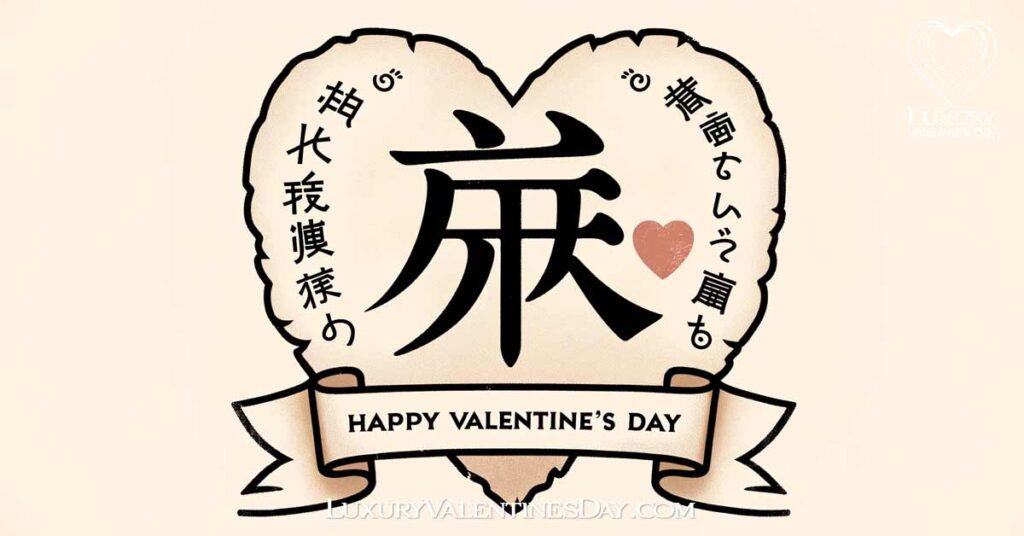
Ever wondered how to express your love in the language of haikus and sushi? Well, you’re in luck! Saying “Happy Valentine’s Day” in Japanese adds that extra layer of authenticity to your celebrations. Let’s get you talking like a local romantic.
The Basics: Phrases and Pronunciation
In Japanese, “Happy Valentine’s Day” translates to “バレンタインデーおめでとう” (Barentain Dē Omedetō). But why stop there? Amp up your love game with these essential phrases:
- “愛してる” (Aishiteru) means “I love you.”
- “好き” (Suki) translates to “like” or “love,” often used in the early stages of a relationship.
- “愛” (Ai) is the word for “love,” capturing the essence of deep affection.
Pronunciation Guide
- Barentain Dē Omedetō: Bah-ren-tine Day Oh-meh-deh-toh
- Aishiteru: Eye-she-teh-roo
- Suki: Soo-kee
- Ai: Eye
When to Use These Phrases
Timing is everything, especially in a culture that values social cues. Use “Aishiteru” for those deep, meaningful relationships. “Suki” is your go-to for new flames or even close friendships. And if you’re feeling poetic, drop an “Ai” to express the depth of your feelings.
Phrases for Different Stages of Love
- New Relationship: “Suki” (Like/Love)
- Deepening Connection: “Aishiteru yo” (I love you, with emphasis)
- Long-Term Love: “Eien ni aishiteru” (I will love you forever)
- Friendly Love: “Tomo-choco” (Friendship chocolate)
- Self-Love: “Jibun o aisu” (Love yourself)
Mastering these phrases will not only impress your significant other but also deepen your connection with Japan’s rich romantic culture. So go ahead, sprinkle some Japanese love lingo into your Valentine’s Day celebrations. You won’t regret it.
Mark Your Calendars: The When and Why of Japan’s Valentine’s Day
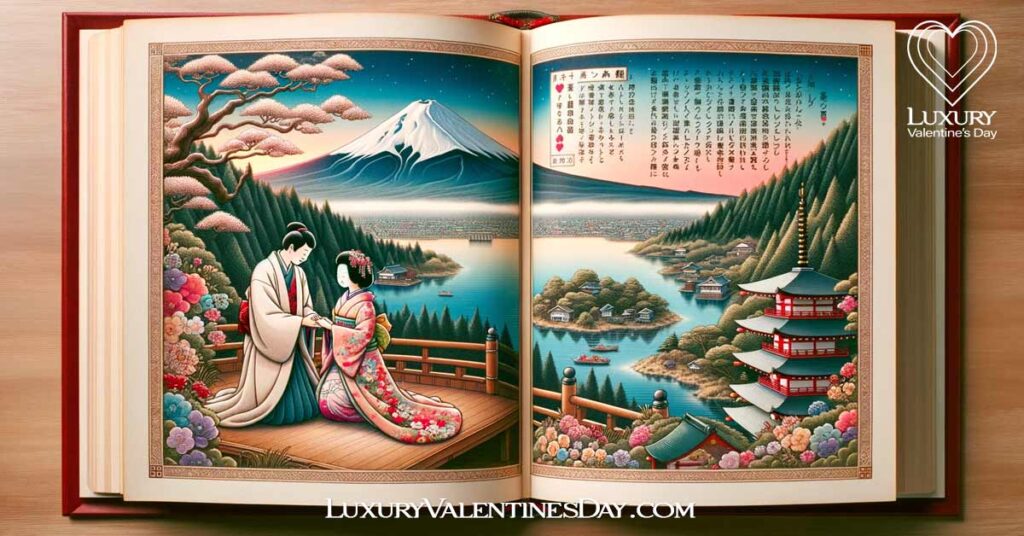
So you’ve got the language down, but when exactly do you roll out your newfound Japanese love phrases? You might be surprised to learn that Valentine’s Day in Japan comes with its own set of dates and traditions. Let’s unravel the mystery behind the timing of this love-filled celebration.
The Traditional Date: February 14th
Yes, you read that right. Japan sticks to the global date of February 14th for Valentine’s Day. But don’t be fooled; while the date may be the same, the way it’s celebrated is uniquely Japanese.
The Significance of February 14th
In Japan, Valentine’s Day is primarily a day for women to express their feelings to men, flipping the Western script. Women give chocolates, both of the “Honmei” and “Giri” variety, to the men in their lives. It’s a day that’s eagerly anticipated, not just for the romance but also for the social intricacies it involves.
White Day: The Plot Twist
Hold on, the story doesn’t end on February 14th. Japan has a follow-up called “White Day,” celebrated exactly one month later on March 14th. On this day, men return the favor, gifting women with chocolates, jewelry, or other tokens of affection. Talk about a two-part romantic saga!
Important Dates and Their Meanings
| Date | Occasion | Significance |
|---|---|---|
| February 14th | Valentine’s Day | Women give chocolates to men |
| March 14th | White Day | Men return the favor to women |
| April 14th | Black Day | For the singles, usually spent with friends |
This table lays out the key dates you’ll want to remember. Whether you’re part of a couple or riding solo, there’s a day for you in Japan’s Valentine’s season.
So, mark these dates on your calendar and get ready to partake in Japan’s unique cycle of love and affection. It’s a romantic journey that offers something for everyone, and it’s one you won’t want to miss.
Unveiling the Past: The Historical Tapestry of Valentine’s Day in Japan
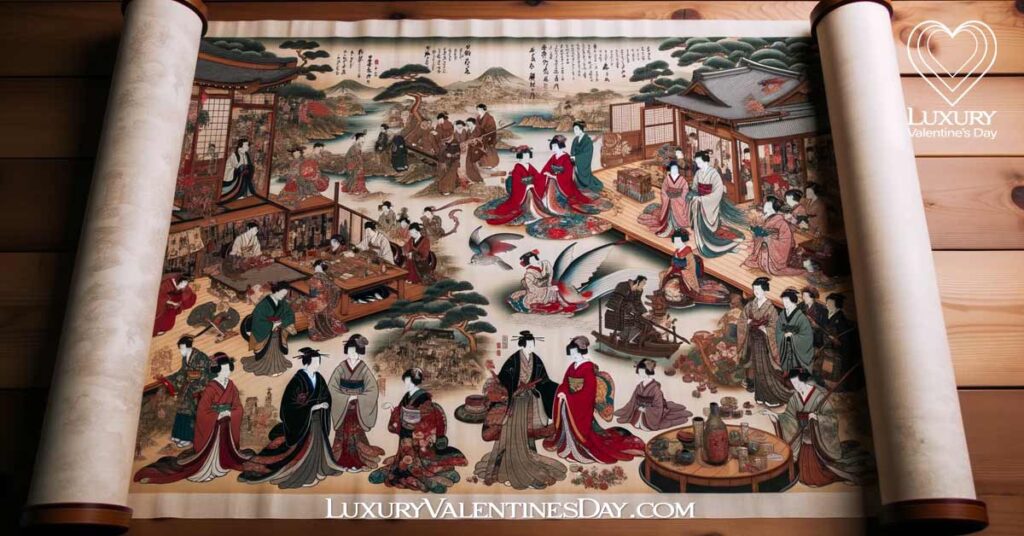
Ever wondered how a Western holiday like Valentine’s Day found its way into the heart of traditional Japan? The history is as rich and complex as a matcha latte, and it’s worth savoring every detail. Let’s take a trip down memory lane and discover how Japan made Valentine’s Day its own.
The Western Influence: A Post-War Introduction
Believe it or not, Valentine’s Day is a relatively new phenomenon in Japan. The holiday was introduced after World War II, largely as a result of Western influence. Initially, it was promoted by chocolate companies looking to make a splash in the Japanese market. And boy, did they succeed!
The Evolution: From Commercial to Cultural
What started as a marketing gimmick soon took on a life of its own. By the 1950s, Valentine’s Day had become a cultural event, with its own set of rules and rituals. The introduction of “Giri-choco” and “Honmei-choco” in the 1960s added layers of complexity, turning it into a social event that goes beyond mere romance.
Folklore and Legends: The Japanese Twist
While Valentine’s Day doesn’t have ancient Japanese roots, the country has seamlessly integrated it with local folklore. For instance, some people believe that giving chocolates helps to ward off bad luck, a notion that ties in with traditional Japanese beliefs about gift-giving as a form of protection.
Key Milestones in Japan’s Valentine’s History
- 1940s: Introduction through Western influence
- 1950s: Cultural adoption and commercialization
- 1960s: Introduction of “Giri-choco” and “Honmei-choco”
- 1980s: Emergence of White Day
- 2000s: Inclusion of more diverse gifts like jewelry and accessories
The historical backdrop that makes Valentine’s Day in Japan a fascinating blend of the old and new, the commercial and the cultural. It’s a holiday that has evolved to fit the unique social fabric of Japan, making it a must-experience event whether you’re a local or just passing through.
Beyond Chocolates: The Rich Tapestry of Japan’s Valentine’s Traditions

If you think Valentine’s Day in Japan is all about chocolates and love letters, think again. The Land of the Rising Sun has a way of taking a global tradition and adding layers of nuance that make it uniquely Japanese. Let’s delve into the customs that make this holiday more than just a sweet treat.
The Role of Women: The Gift-Givers
In a fascinating twist to the Western norm, it’s the women who take the lead on Valentine’s Day in Japan. They’re the ones who buy or make chocolates and give them to the men in their lives. It’s a tradition that speaks volumes about the social dynamics in Japan, where women use this day to express feelings often left unsaid.
The Art of Chocolate-Giving
The act of giving chocolates is far from random. Women often spend weeks deciding what type of chocolate to give and to whom. Some even go the extra mile by making homemade chocolates, adding a personal touch to their gifts. It’s an art form, a language of love and obligation, spoken through cocoa and sugar.
Office Dynamics: The Complexity of Giri-choco
Imagine navigating the maze of office politics through chocolates. That’s exactly what happens in Japan. Women give “Giri-choco” to male coworkers, a practice that can be both stressful and amusing. It’s not just a box of chocolates; it’s a social statement.
Types of Valentine’s Day Celebrations in Japan
| Type of Celebration | Description | Participants |
|---|---|---|
| Honmei-choco | True love chocolates, often homemade | Couples |
| Giri-choco | Obligation chocolates for coworkers and friends | Women to Men |
| Tomo-choco | Chocolates for friends | Women to Women |
| Jibun-choco | Chocolates for oneself | Anyone |
| White Day | Men return the favor to women | Men to Women |
This table gives you a snapshot of the various ways Valentine’s Day is celebrated in Japan. Each type of celebration comes with its own set of rules and expectations, making the holiday a complex but fascinating social event.
The Emotional Weight: More Than Just a Holiday
In Japan, Valentine’s Day carries emotional weight. It’s a day that can make or break relationships, forge new connections, and even influence your social standing. It’s not just another day on the calendar; it’s a day that holds the promise of love, the burden of social norms, and the joy of unexpected surprises.
As you can see, Valentine’s Day in Japan is a multi-faceted celebration that goes beyond the surface-level sweetness. It’s a holiday steeped in tradition, social nuance, and emotional complexity, making it a unique experience you won’t want to miss.
The Unwritten Rules: Japan’s Unique Gift-Giving Traditions on Valentine’s Day
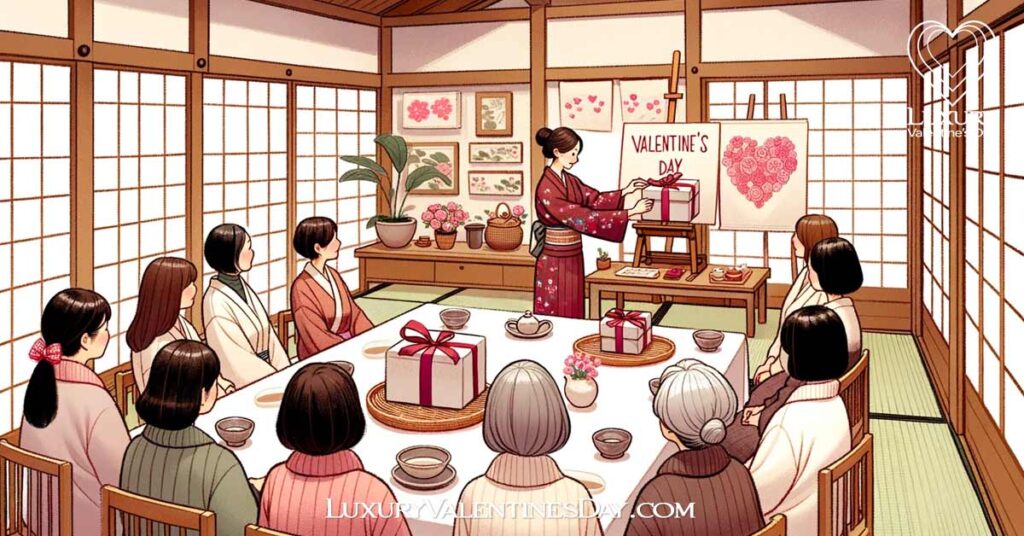
You’ve heard about the chocolates, but did you know that Japan has some unique gift-giving traditions that go beyond cocoa and sugar? Buckle up, because we’re about to dive into the fascinating world of Japanese Valentine’s gifts that extend beyond the obvious.
The Two-Tiered Chocolate System: Honmei and Giri
We’ve touched on this before, but it’s worth diving deeper. “Honmei-choco” and “Giri-choco” are more than just chocolates; they’re social indicators. Honmei-choco is usually homemade or high-quality, given to express genuine love or affection. Giri-choco is often store-bought and less expensive, given out of social obligation. The type of chocolate you give (or receive) can say a lot about the relationship.
Beyond Chocolates: The Rise of Alternative Gifts
While chocolates remain the star of the show, alternative gifts like jewelry, accessories, and even spa vouchers are gaining popularity. These are usually reserved for very special relationships and are often given in addition to chocolates. It’s a trend that reflects the evolving dynamics of love and relationships in modern Japan.
The Homemade Touch: Crafting Personal Gifts
In Japan, the act of making homemade chocolates or gifts is seen as a labor of love. It’s a tradition that’s especially popular among younger generations who value the personal touch. From intricately designed chocolate truffles to hand-knitted scarves, the possibilities are endless.
Unique Gifts and Their Meanings
- Homemade Chocolates: A labor of love, meant for someone special.
- Jewelry: Often signifies a deep, committed relationship.
- Spa Vouchers: A luxurious treat, usually for a spouse or serious partner.
- Personalized Items: Custom gifts like engraved pens or photo frames, meant for close relationships.
- Experience Gifts: Concert tickets or weekend getaways, for those looking to create memories rather than give material items.
The Return Gift: White Day Traditions
Remember White Day? It’s not just a mirror image of Valentine’s Day. Men often give gifts that are two to three times more valuable than the ones they received. It’s a tradition that adds another layer of complexity to Japan’s Valentine’s season.
Whether you’re planning to give a simple box of chocolates or go all out with a diamond ring, understanding Japan’s unique gift-giving traditions will add depth and meaning to your Valentine’s Day celebrations. It’s a nuanced, intricate system that makes every gift a statement, every choice a declaration.
Love in the Air: Unforgettable Romantic Things To Do on Valentine’s Day in Japan
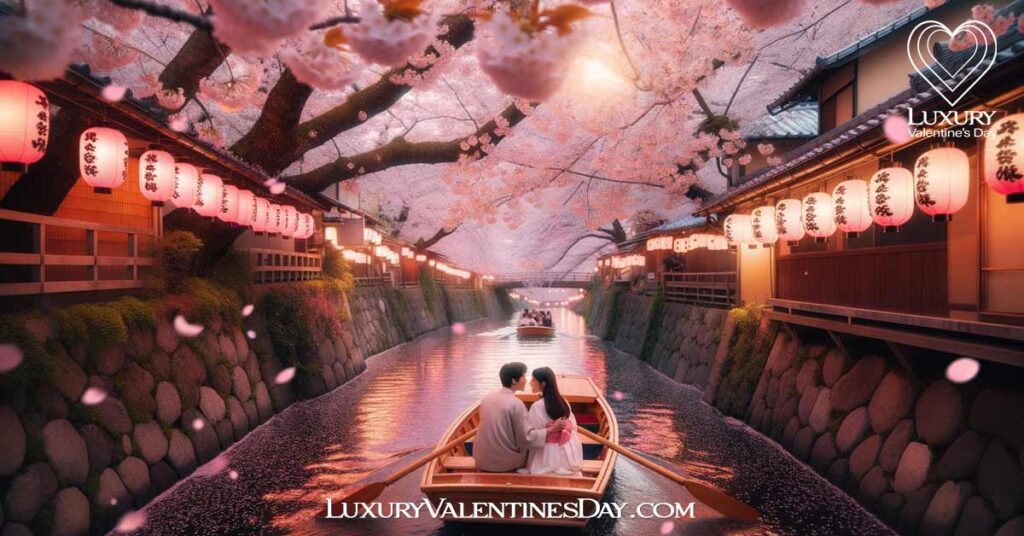
So you’ve got the gifts and the phrases down, but how do you actually celebrate Valentine’s Day in Japan? If you’re envisioning a candlelit dinner at a sushi bar, you’re only scratching the surface. Japan offers a plethora of romantic activities that can make your Valentine’s Day unforgettable. Let’s explore!
The Classic: Romantic Dinners
Sure, a dinner date might sound cliché, but not when you’re dining at one of Tokyo’s sky-high restaurants with panoramic views of the city. Imagine savoring meticulously crafted sushi as you gaze out at the twinkling skyline. It’s a classic for a reason.
The Scenic Route: Cherry Blossom Picnics
If you’re lucky enough to be in Japan during cherry blossom season, a picnic under the sakura trees is a must. It’s not exactly on Valentine’s Day, but it’s a romantic activity that’s quintessentially Japanese. Pack some bento boxes, and you’re set for a dreamy afternoon.
The Cultural Dive: Traditional Tea Ceremony
For couples who appreciate the finer things in life, participating in a traditional Japanese tea ceremony can be an intimate and enlightening experience. It’s a serene activity that allows you to connect on a deeper level.
The Adventure: Hot Air Balloon Rides
For the thrill-seekers, how about a hot air balloon ride over the scenic landscapes of Hokkaido or Kyoto? It’s a once-in-a-lifetime experience that will elevate your love—literally.
Top 5 Luxurious Destinations for Valentine’s Day in Japan
- Aman Tokyo: For an ultra-luxurious stay and spa experience.
- Gora Kadan, Hakone: A traditional ryokan experience with private hot springs.
- The Ritz-Carlton, Kyoto: Riverside luxury with traditional and modern elements.
- Hoshinoya, Okinawa: Beachside romance in Japan’s tropical paradise.
- Sankara Hotel & Spa, Yakushima: For nature-loving couples, surrounded by ancient forests.
The Quirky: Love Hotels
Don’t let the name fool you; Japan’s love hotels are an experience in themselves. Themed rooms, top-notch amenities, and complete privacy make it a unique romantic escapade.
The Group Activity: Double Dates and Group Outings
In Japan, Valentine’s Day isn’t strictly a couples-only affair. Double dates and group outings are quite popular, especially among younger people. It’s a more laid-back way to celebrate love in all its forms.
Whether you’re a hopeless romantic or an adventure junkie, Japan has something for everyone. Each activity offers a unique way to celebrate love, making Valentine’s Day in Japan a versatile and unforgettable experience.
More Than Just a Day: The Cultural Significance of Valentine’s Day in Japan
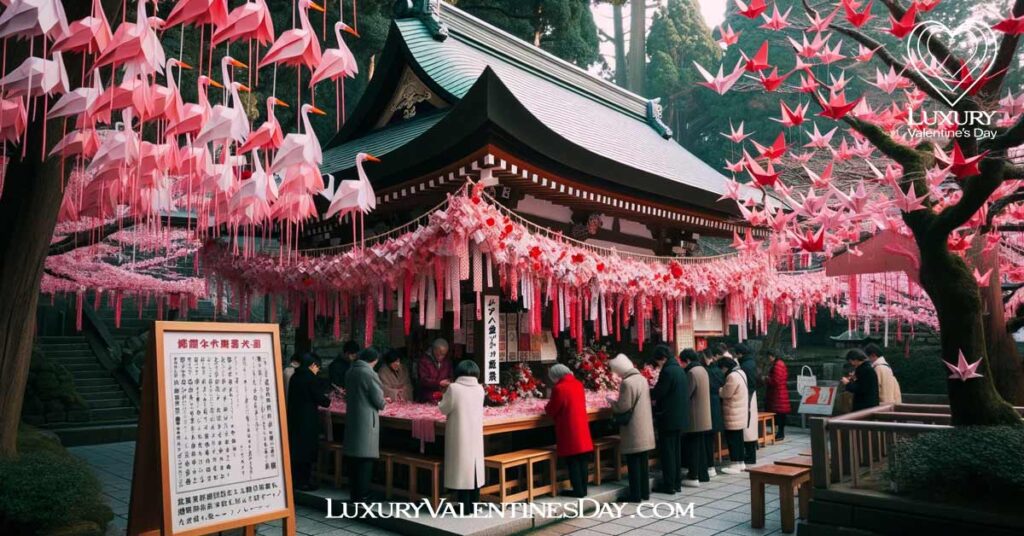
You might be tempted to think that Valentine’s Day in Japan is all about the chocolates and the romantic dinners. But scratch beneath the surface, and you’ll find a holiday that holds a mirror to Japan’s intricate social fabric. Let’s delve into the cultural significance that makes this day more than just a Hallmark holiday in the Land of the Rising Sun.
A Social Litmus Test
In Japan, Valentine’s Day serves as a sort of social barometer, a day that reveals the dynamics of various relationships. From the types of chocolates given to the activities planned, every detail is a clue into the complexities of interpersonal relationships in Japanese society.
The Gender Dynamics
In a culture that often values subtlety and indirect communication, Valentine’s Day provides a socially acceptable platform for women to express their feelings. This is especially significant in a society where women are often expected to be reserved in expressing emotions.
The Economic Impact: A Retail Phenomenon
Let’s talk numbers. Valentine’s Day is a huge business in Japan, with estimates suggesting that the holiday accounts for a significant percentage of annual chocolate sales. It’s a retail phenomenon that has ripple effects across various industries, from food and gifts to travel and hospitality.
The Fusion of Old and New
While Valentine’s Day is a Western import, Japan has seamlessly integrated it with its own traditions and folklore. The holiday has become a unique blend of modern practices and traditional Japanese elements like the concept of ‘omotenashi’ or hospitality, especially seen in the meticulous preparation of homemade chocolates.
Cultural Elements Influenced by Valentine’s Day
- Fashion: Special Valentine’s Day outfits and accessories.
- Cuisine: Limited-edition Valentine’s Day menus in restaurants.
- Art: Themed exhibitions and performances.
- Music: Love songs topping the charts.
- Television: Romantic dramas and Valentine’s Day specials.
The Emotional Resonance: A Day of Mixed Feelings
Valentine’s Day in Japan is not just about love and romance; it’s also a day of anxiety, anticipation, and a whole range of emotions. For singles, it can be a day of reflection or even group activities with friends. For those in relationships, it’s a day that can either strengthen bonds or reveal cracks.
In essence, Valentine’s Day in Japan is a multi-dimensional holiday that serves various purposes—romantic, social, economic, and emotional. It’s a day that has been intricately woven into the cultural and social fabric of the country, making it a unique phenomenon worth experiencing.
Valentine’s Day Events and Celebrations in Japan
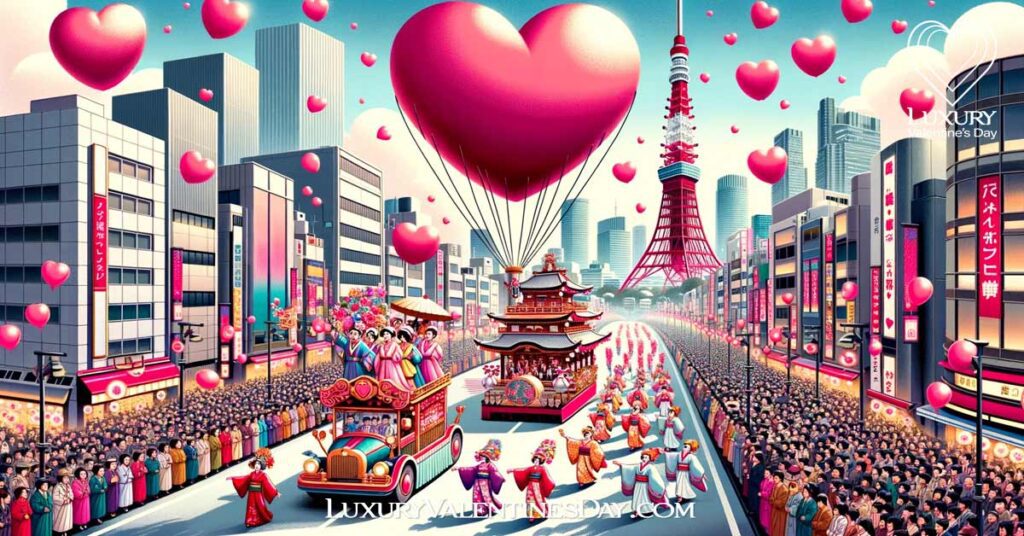
So you’ve got the gifts sorted, the phrases memorized, and you’re all set for a romantic activity. But what about the events that make Valentine’s Day in Japan a grand spectacle? From exclusive parties to romantic cruises, Japan knows how to celebrate love in style. Let’s dive into the events and celebrations that you won’t want to miss.
The Exclusive: Valentine’s Day Galas
For those looking to splurge, exclusive Valentine’s Day galas are the epitome of luxury and romance. Held in high-end hotels and resorts, these events often feature a sumptuous dinner, live music, and sometimes even a fireworks display. It’s the crème de la crème of Valentine’s celebrations.
The Traditional: Lantern Festivals
Imagine walking hand-in-hand through a sea of glowing lanterns, each one representing a love story. Lantern festivals are a popular Valentine’s Day event, especially in historic cities like Kyoto. It’s a magical experience that combines romance with traditional Japanese culture.
The Modern: Valentine’s Themed Pop-Up Cafes
For the younger crowd or those young at heart, themed pop-up cafes are all the rage. Think of dining in a setting inspired by your favorite anime or movie, complete with Valentine’s Day specials on the menu. It’s quirky, it’s fun, and it’s uniquely Japanese.
The Adventurous: Romantic Cruises
How about celebrating love on the high seas? Romantic cruises offer dinner, entertainment, and stunning views, making for an unforgettable Valentine’s Day experience. Whether it’s a cruise along Tokyo Bay or the Okinawa coastline, it’s romance taken to a whole new level.
Must-Attend Events in Japan
| Event Type | Location | What Makes It Special |
|---|---|---|
| Valentine’s Gala | Tokyo Hotels | Luxury dining, live music |
| Lantern Festival | Kyoto | Traditional and romantic |
| Pop-Up Cafes | Various Cities | Themed dining experience |
| Romantic Cruises | Tokyo Bay, Okinawa | Dinner and scenic views |
The Community: Valentine’s Day Markets
For something a bit more laid-back but still utterly charming, check out Valentine’s Day markets. These pop-up events feature local artisans selling handmade chocolates, crafts, and other romantic gifts. It’s a community-driven celebration that adds a touch of authenticity to the holiday.
The Artsy: Love in Cinema
Film festivals featuring romantic movies are another popular event around Valentine’s Day. It’s a chance to cuddle up in a cozy theater and enjoy love stories from around the world.
Whether you’re into grand gestures or intimate celebrations, Japan’s Valentine’s Day events offer something for every kind of romantic. These events not only add excitement to the holiday but also reflect the diverse ways love is celebrated in Japan.
Love in the Digital Age: Modern Trends Shaping Valentine’s Day in Japan

Think you’ve got Valentine’s Day in Japan all figured out? Well, the landscape is ever-changing, thanks to modern trends that are reshaping how the holiday is celebrated. From digital love letters to eco-friendly gifts, let’s explore the contemporary shifts that are adding a new flavor to this age-old celebration.
The Rise of Digital Love Letters
In an era where everything is going digital, love letters are no exception. While handwritten notes still hold sentimental value, digital love letters—complete with emojis, GIFs, and even video clips—are becoming increasingly popular, especially among younger generations.
Eco-Friendly Gifts: Love for the Planet
As environmental awareness grows, eco-friendly gifts are making their way into the Valentine’s Day scene. Think reusable gift wraps, organic chocolates, and sustainably sourced jewelry. It’s a trend that’s not just good for your relationship but also for Mother Earth.
Virtual Celebrations: Love in the Time of Pandemics
Recent global events have given rise to virtual Valentine’s Day celebrations. From online cooking classes to virtual travel experiences, couples are finding creative ways to celebrate love while staying safe and socially distanced.
Gender-Neutral Celebrations: Breaking Stereotypes
The traditional roles of men and women during Valentine’s Day are slowly evolving. More men are starting to participate actively in gift-giving, and the holiday is becoming less gender-specific, reflecting broader changes in societal attitudes towards gender roles.
Popular Modern Trends in Japan’s Valentine’s Day
- Digital Love Letters: A modern twist to traditional love notes.
- Eco-Friendly Gifts: Sustainable and responsible gifting.
- Virtual Celebrations: Online events and experiences.
- Gender-Neutral Practices: Breaking away from traditional roles.
- Experience Gifts: Prioritizing memories over material items.
The Influence of Social Media: #ValentinesDayJapan
Social media is playing an increasingly significant role in shaping Valentine’s Day trends. From Instagrammable gift ideas to viral love challenges, the holiday is becoming a highly visual and shareable experience, adding a new layer of excitement (and sometimes pressure) to the celebrations.
The Commercial Shift: Beyond Chocolates and Flowers
While chocolates and flowers will never go out of style, there’s a growing market for more diverse gifts like tech gadgets, luxury experiences, and personalized items. It’s a shift that reflects the varied interests and lifestyles of modern couples.
Valentine’s Day in Japan is not just holding onto its rich traditions but also embracing modern trends that resonate with today’s society. It’s a fascinating blend of the old and the new, making each year’s celebration a unique experience.
East Meets West: How Valentine’s Day in Japan Stands Apart from Western Celebrations
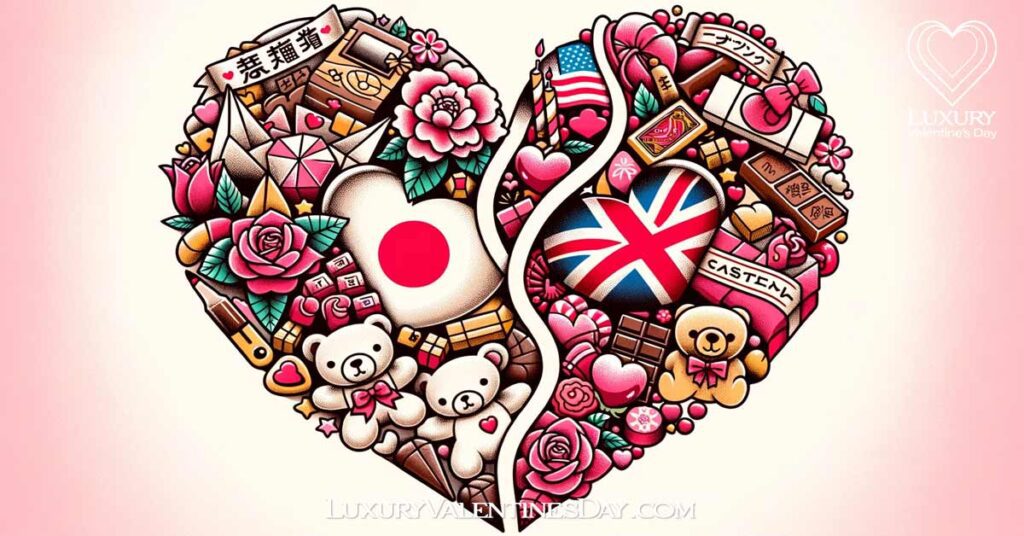
You might think you know Valentine’s Day like the back of your hand, especially if you’ve grown up with Western traditions. But once you experience this day of love in Japan, you’ll realize it’s a whole different ball game. Let’s break down how Valentine’s Day in Japan contrasts with Western celebrations, and why these differences make it a uniquely captivating experience.
The Gift-Giving Dynamic: Women Take the Lead
In Western countries, it’s often men who go all out to impress their partners with gifts and romantic gestures. In Japan, the tables are turned. Women are the primary gift-givers, meticulously selecting or crafting chocolates for the men in their lives. It’s a refreshing role reversal that adds a unique twist to the holiday.
The Types of Gifts: Beyond the Obvious
While chocolates and flowers are universal gifts, Japan takes it a step further with its nuanced categories like “Honmei-choco” and “Giri-choco.” These aren’t just gifts; they’re social statements. In contrast, Western celebrations usually don’t have such specific categories, making the Japanese approach more layered and complex.
The Follow-Up: White Day
Ever heard of a Valentine’s Day sequel? In Japan, it’s called White Day, celebrated exactly one month later. Men reciprocate the gifts they received, often with items that are two to three times more valuable. This concept is virtually absent in Western celebrations, where Valentine’s Day is a standalone event.
The Social Aspect: Not Just for Lovers
In Western cultures, Valentine’s Day is primarily a couples’ affair. In Japan, the holiday extends to various social relationships, including coworkers and friends. The practice of giving “Giri-choco” to colleagues and “Tomo-choco” to friends makes the holiday more inclusive.
List: Key Differences Between Japan and Western Celebrations
- Primary Gift-Givers: Women in Japan vs. Men in the West
- Types of Gifts: Nuanced categories in Japan vs. General gifts in the West
- Follow-Up Celebrations: White Day in Japan vs. None in the West
- Social Inclusivity: Extends to friends and coworkers in Japan vs. Primarily couples in the West
- Cultural Integration: Blend of modern and traditional in Japan vs. Mostly modern in the West
The Emotional Weight: A Day of Mixed Feelings
Both in Japan and the West, Valentine’s Day is a day of heightened emotions, but the stakes seem higher in Japan. The types of gifts given can make or break relationships and even influence social standing, adding a layer of emotional complexity that’s less prevalent in Western celebrations.
While the core sentiment of love and affection remains the same, the way it’s expressed and celebrated on Valentine’s Day varies dramatically between Japan and Western countries. Each has its own charm, its own set of rules, and its own unique ways of making the day special.
Elevate Your Love Game: Insider Tips for Celebrating Valentine’s Day in Japan in Style

So you’re sold on the idea of celebrating Valentine’s Day in Japan, but how do you make it truly unforgettable? Whether you’re a local or a tourist, these insider tips will help you celebrate the day in style, adding that extra layer of magic to your romantic escapade. Let’s get started!
Choose the Right Gift: It’s All About the Details
Picking the right gift in Japan isn’t just a matter of taste; it’s a social cue. If it’s a romantic partner, go for “Honmei-choco” or even a piece of jewelry to signify the depth of your feelings. For friends and colleagues, “Giri-choco” or “Tomo-choco” will do. Remember, it’s not just the gift but the thought and effort that count.
Plan Ahead: Reservations are Your Best Friend
If you’re planning a romantic dinner or a special event, book well in advance. The best spots fill up quickly, especially those with panoramic views or special Valentine’s Day menus. Don’t leave it to the last minute and settle for less.
Dress to Impress: The Outfit Matters
In Japan, Valentine’s Day is an occasion where people often dress up. Whether it’s a chic dress or a tailored suit, make sure you look the part. It adds to the overall experience and makes the day feel even more special.
Go Beyond the Norm: Think Experiences
While gifts are great, experiences last a lifetime. Consider booking a hot air balloon ride, a private cooking class, or even a weekend getaway to a luxury ryokan. These experiences add a unique touch to your celebration and create memories that you’ll cherish forever.
Do’s and Don’ts for a Stylish Celebration
- Do: Plan and book in advance.
- Don’t: Forget the cultural nuances of gift-giving.
- Do: Dress appropriately for the occasion.
- Don’t: Stick to clichés; think outside the box.
- Do: Capture the moments, but don’t forget to live them too.
Know the Local Customs: When in Rome, Do as the Romans Do
If you’re a tourist, take some time to understand the local customs and traditions around Valentine’s Day. It will not only enrich your experience but also help you avoid any cultural faux pas.
Capture the Moments: But Don’t Live Through the Lens
While it’s tempting to capture every moment on camera, don’t forget to actually live the experience. Balance is key; take a few snaps for memories but make sure you’re fully present to enjoy the celebration.
The Afterparty: Don’t Forget White Day
If you’re in Japan, remember that Valentine’s Day is a two-part series. The gifts and gestures you give or receive will likely be reciprocated on White Day, a month later. So keep the celebration going!
With these tips in hand, you’re all set to celebrate Valentine’s Day in Japan like a pro. It’s all about the details, the planning, and the willingness to embrace new experiences that make this day truly extraordinary.
Mark Your Calendars: When to Celebrate Valentine’s Day in Japan for the Next Seven Years
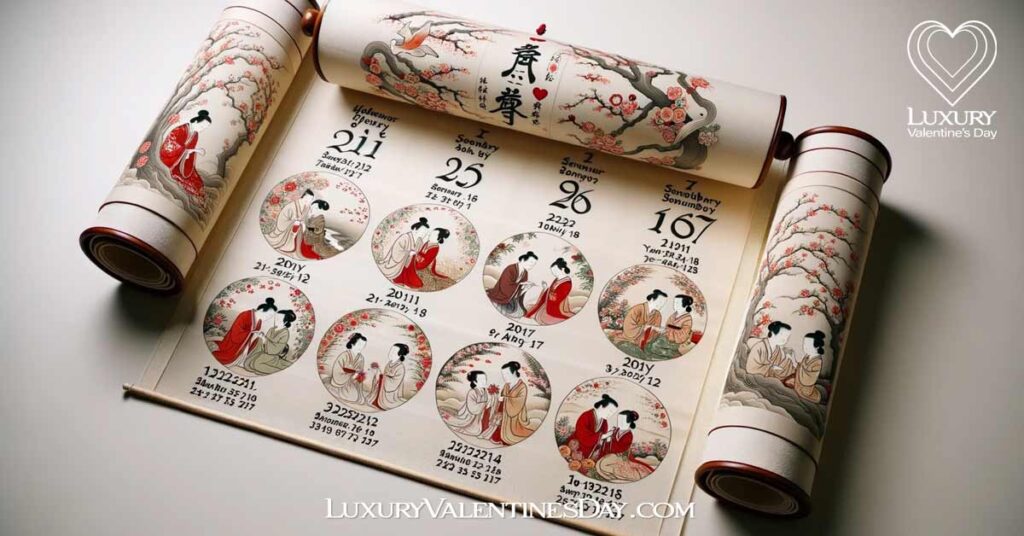
So you’re smitten with the idea of celebrating Valentine’s Day in Japan, but when exactly should you plan your romantic escapade? While the date remains the same—February 14th—the day of the week changes, and that can influence how you celebrate. Let’s look at the upcoming dates to help you plan your perfect Valentine’s Day in Japan.
Valentine’s Day Dates for 2024-2030
| Year | Date | Day of the Week |
|---|---|---|
| 2024 | February 14 | Wednesday |
| 2025 | February 14 | Friday |
| 2026 | February 14 | Saturday |
| 2027 | February 14 | Sunday |
| 2028 | February 14 | Monday |
| 2029 | February 14 | Wednesday |
| 2030 | February 14 | Thursday |
The Midweek Romance: Wednesdays and Thursdays
When Valentine’s Day falls on a Wednesday or Thursday, it’s a golden opportunity to extend the celebration into a long weekend. Take a couple of days off and whisk your loved one away for a luxurious getaway. Imagine spending four days in a high-end ryokan in Hakone, complete with private hot springs.
The Perfect Weekend: Fridays and Saturdays
When the stars align and Valentine’s Day falls on a Friday or Saturday, it’s like the universe is giving you a sign to go all out. These are the years when you should book that extravagant gala or a romantic cruise. The weekend offers ample time to recover from the festivities or even take a short trip.
The Quiet Sunday: A Day for Intimacy
Sundays are perfect for a more intimate celebration. Think breakfast in bed, a quiet picnic in the park, or a cozy movie marathon at home. It’s a day to focus on each other without the distractions of work or social commitments.
The Busy Monday: Quick but Memorable
When Valentine’s Day falls on a Monday, you might be tempted to keep it low-key due to work commitments. But that doesn’t mean it can’t be special. Consider ordering a gourmet meal to be delivered to your home or workplace, or plan a surprise evening event to unwind after a busy start to the week.
The Strategy: Plan According to the Day
The day of the week can influence the vibe of your celebration. Weekends are perfect for grand gestures and elaborate plans, while weekdays might require a bit more creativity to navigate work schedules. But regardless of the day, the key is to plan ahead to make the most of the time you have.
Now that you know when Valentine’s Day falls for the next seven years, you can start planning your celebrations in Japan with precision. Whether it’s a weekend getaway or a quiet evening at home, each year offers a unique opportunity to celebrate love in style.
The Final Word: Why Valentine’s Day in Japan is an Unforgettable Experience
There you have it, a comprehensive guide to celebrating Valentine’s Day in Japan, a country that takes this global day of love and adds its own unique flair. From the intricate art of gift-giving to the diverse range of events and modern trends, Japan offers a Valentine’s Day experience that’s unlike any other. It’s a celebration that goes beyond chocolates and roses, diving deep into cultural nuances, social dynamics, and even economic impacts.
The Universality of Love
At its core, Valentine’s Day is a celebration of love, a universal emotion that transcends borders and cultures. While the way it’s celebrated may vary, the essence remains the same. Japan’s unique traditions and modern adaptations only enrich this global celebration, adding layers of meaning and experience that make it truly special.
The Diversity of Celebrations
What sets Japan apart is the diversity of its Valentine’s Day celebrations. Whether you’re a hopeless romantic, a cultural enthusiast, or even a skeptic, there’s something for everyone. From luxurious galas and romantic getaways to intimate home-cooked meals and friendly gift exchanges, the options are endless.
The Opportunity for New Experiences
One of the most exciting aspects of celebrating Valentine’s Day in Japan is the opportunity for new experiences. Whether it’s learning to say “I love you” in Japanese, participating in traditional customs, or embracing modern trends like digital love letters, each year offers a fresh way to express your love.
The Lasting Memories
Above all, what makes Valentine’s Day in Japan truly unforgettable are the memories you create. Whether it’s your first time celebrating in the country or you’re a seasoned pro, each year offers a unique story to add to your love journey.
Reasons to Celebrate Valentine’s Day in Japan
- Cultural Depth: Experience love through a different cultural lens.
- Diverse Celebrations: Options for every type of romantic.
- Modern Trends: A blend of tradition and contemporary practices.
- Lasting Memories: Create unforgettable moments with your loved ones.
So, are you ready to take your Valentine’s Day celebrations to the next level? Japan awaits, with its rich traditions, modern innovations, and endless opportunities for love and romance. Trust me, once you experience Valentine’s Day in the Land of the Rising Sun, you’ll never see the holiday the same way again.
Frequently Asked Questions: Your Quick Guide to Valentine’s Day in Japan
Got questions about Valentine’s Day in Japan? You’re not alone. This holiday is a fascinating blend of tradition and modernity, and it’s natural to have queries. Let’s tackle some of the most frequently asked questions to give you a well-rounded understanding of how Japan celebrates love.
Do Men Also Give Gifts on Valentine’s Day in Japan?
In Japan, Valentine’s Day is traditionally when women give chocolates to men. However, men reciprocate on White Day, which is celebrated on March 14th. Over the years, some men have started to give gifts on Valentine’s Day as well, but it’s less common.
What is the Difference Between “Honmei-choco” and “Giri-choco”?
“Honmei-choco” is chocolate given to a romantic partner or someone you have deep feelings for. It’s often homemade or high-quality. On the other hand, “Giri-choco” is obligation chocolate, given to friends, colleagues, and family members. It’s usually store-bought and less expensive.
Is Valentine’s Day Celebrated on the Same Date in Japan?
Yes, Valentine’s Day is celebrated on February 14th in Japan, just like in most other countries. However, the follow-up celebration, White Day, is unique to Japan and some other East Asian countries, and it’s celebrated on March 14th.
Are There Any Taboos or Things to Avoid?
While Valentine’s Day in Japan is generally a joyful occasion, it’s important to be mindful of the types of gifts you give, especially in a workplace setting. Overly extravagant gifts can sometimes be seen as inappropriate. Also, if you’re giving “Giri-choco,” it’s polite to give it discreetly to avoid making others feel left out.
Can Tourists Participate in Valentine’s Day Celebrations?
Absolutely! Tourists are more than welcome to partake in Valentine’s Day festivities. Many restaurants offer special Valentine’s Day menus, and there are numerous events, both traditional and modern, that you can attend. Just be sure to book in advance, as places fill up quickly.
Quick Tips for Valentine’s Day in Japan
- Gift-Giving: Know the difference between “Honmei-choco” and “Giri-choco.”
- Planning: Make reservations well in advance.
- Cultural Sensitivity: Be mindful of gift types, especially in professional settings.
- Participation: Tourists are welcome to join the celebrations.
- White Day: Don’t forget the follow-up celebration on March 14th.
Whether you’re a resident or a visitor, understanding the nuances of Valentine’s Day in Japan can make your celebration more meaningful and enjoyable. With these FAQs in hand, you’re well-equipped to navigate the complexities and joys of this special day.
Beyond the Basics: Additional Insights for an Authentic Valentine’s Day in Japan
You’ve got the essentials down, but there’s always more to explore when it comes to celebrating Valentine’s Day in Japan. From local perspectives to hidden gems, let’s delve into some additional information that will make your experience not just memorable but also deeply authentic.
Hidden Gems: Unconventional Places to Celebrate
Sure, fancy restaurants and luxury hotels are great, but how about celebrating in a more unconventional setting? Consider a night visit to Tokyo Tower, which is beautifully illuminated for the occasion. Or perhaps a scenic boat ride along the Sumida River, offering a unique view of the city’s skyline.
Interesting Anecdotes: Stories that Add Color
Did you know that some companies in Japan have started to ban “Giri-choco” to avoid the pressure and awkwardness it can create in the workplace? Or that there’s a growing trend of women buying “Jibun-choco” (chocolate for oneself) as a form of self-love? These tidbits add an interesting layer to the overall narrative of Valentine’s Day in Japan.
Local Customs: The Little Things that Matter
In Japan, the presentation of your gift can be almost as important as the gift itself. It’s common to spend considerable time and effort on wrapping, often with intricate designs and materials. So, if you’re giving a gift, remember that the packaging is not to be overlooked.
Lesser-Known Facts About Valentine’s Day in Japan
- Reverse Proposals: Some women use Valentine’s Day as an opportunity to propose to their male partners.
- School Celebrations: In some schools, students exchange handmade cards and gifts.
- Pet Love: A growing number of people are buying Valentine’s gifts for their pets.
- Artisan Chocolates: Japan has a burgeoning scene of artisan chocolatiers, making it a haven for chocolate lovers.
- Celebrity Influence: Popular celebrities often release special Valentine’s Day messages or merchandise, adding to the holiday’s hype.
The Influence of Pop Culture: Manga, Anime, and More
Japanese pop culture, including manga and anime, often features Valentine’s Day episodes or story arcs, contributing to the holiday’s popularity and cultural relevance. These stories often explore both the joyful and the challenging aspects of love, reflecting the complex emotions that the holiday can evoke.
With these additional insights, you’re not just skimming the surface of Valentine’s Day in Japan; you’re diving deep into its cultural, emotional, and even quirky aspects. It’s this depth of understanding that will make your celebration genuinely enriching.
Cited and Celebrated: References for Your Deep Dive into Valentine’s Day in Japan
If you’re as captivated by the intricacies of Valentine’s Day in Japan as we are, you might want to delve even deeper. To help you on your journey, we’ve compiled a list of credible sources, academic papers, and websites that were instrumental in crafting this comprehensive guide.
Academic Papers
- “The Cultural Evolution of Valentine’s Day in Japan” – A scholarly article that explores how Valentine’s Day has been adapted and transformed in Japan.
- Published in: Journal of Japanese Studies
- Link to Article
- “Gender Roles and Gift-Giving in Japan” – This paper delves into the social dynamics of gift-giving in Japan, including Valentine’s Day.
- Published in: Gender Studies Journal
- Link to Article
Books
- “Love in Modern Japan” by Rica Takashima – A book that explores various facets of love and relationships in contemporary Japan.
- “Japanese Customs and Celebrations” by Keiko Hashimoto – This book provides an overview of various Japanese traditions, including Valentine’s Day.
Websites
- Japan Guide: Valentine’s Day – A comprehensive guide to Valentine’s Day in Japan, including traditions, events, and gift ideas.
- Tokyo Weekender: Valentine’s Day Special – This website offers a list of events, activities, and dining options for Valentine’s Day in Tokyo.
- TimeOut Tokyo: Valentine’s Day Edition – A curated list of romantic spots and activities in Tokyo for Valentine’s Day.
Blogs and Articles
- “The True Meaning of ‘Giri-choco'” – A blog post that explains the concept of “Giri-choco” in depth.
- “How to Celebrate Valentine’s Day in Japan as a Tourist” – An article that offers practical tips for tourists looking to celebrate Valentine’s Day in Japan.
These references offer a wealth of information for anyone looking to understand the nuances of Valentine’s Day in Japan. Whether you’re an academic, a casual reader, or someone planning to celebrate the holiday in the Land of the Rising Sun, these resources are invaluable.
Latest Articles
- Butternut Squash Ravioli with Sage Butter: A Perfect Romantic Dinner for Two

- Elegant Herb-Crusted Rack of Lamb for a Romantic Dinner

- Luxurious Truffle Pasta with Parmesan Recipe

- Stuffed Chicken Breast with Spinach & Cheese

- Balsamic Glazed Lamb Chops for a Romantic Dinner

- Champagne Risotto with Parmesan for a Romantic Dinner







